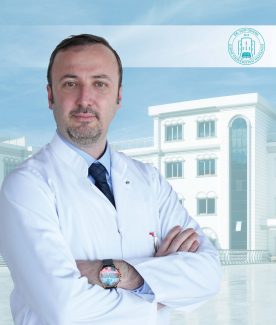General Internal diseases is a discipline which forms a foundation to all clinical branches of medicine. Most patients who consult with healthcare organisations have problems which falls under the interest of internal diseases. It has a wide scope including upper and lower respiratory diseases, hypertension, gastrointestinal system, thyroid, blood sugar, blood, oncology - cancer and rheumatic diseases. Internal diseases also include standing examination, overnight monitoring and treatment, emergency service and check-up services. Department of internal diseases deals with first examination and necessary inspections as well as overnight staying patient treatments, consultations, pre-operation preparations and necessary interventions. Our patients can reduce future risks of potential diseases by being regularly examined and consulting with our doctors. A multidisciplinary system is applied in all departments of Dr. Suat Günsel University of Kyrenia Hospital. This system has also been integrated into the department of Internal Diseases. In our department, our patients are evaluated with cooperation of sub disciplines within this system to provide them better inspections and treatments by consulting with other specialists’ perspectives. SUBUNITS OF DEPARTMENT OF INTERNAL DISEASES Emergency Internal Diseases Rheumatology Gastroenterology Haematology Nephrology Endocrinology Internal Intensive Care The treatments of the patients staying overnight are performed carefully by specialist physicians and nurses. Oncology Check-up and Preventive Medicine In our preventive medicine service, after our specialist doctors determine potential risks, they will advise you on necessary precautions you may take. Preventive medicine services provided in our department: Check-up services which are important parts of preventive medicine services in our department are carried out by patient specific programmes based on their age, gender and risk of illness. Especially chronic diseases have no or low symptom periods where the disorders appear to be because of exhaustion and other problems. Permanent damage and symptoms may be experienced depending on the capacity of use of the organs. Check-up programmes are very important for the potential disease or the diagnosis of the already existing risk. Regular check-ups help diagnosis of a disease without symptoms, early treatment, taking precautions for risk factors related to some diseases and early diagnosis of contagious diseases as well as preventing its infection around the environment. Check-up programmes aim to keep the person healthy before the disease occurs by taking precautions, and they are extremely important in terms of life longevity and quality for the individual. Heart disease risk can be detected with a simple blood test and serious diseases like cancer can be detected at its inception. Therefore, individuals must be examined at least once a year by specialists. What type of diseases does the department of internal diseases deal with? COMPLAINTS REGARDING DEPARTMENT OF INTERNAL DISEASES: Difficulty in Breathing: Chest and Back Pain: Coughing and phlegm: Abdominal Pain: Headache: Throat and Neck Pain: Joint Pain: Can be experienced in any rheumatic disease Weariness and Lack of appetite: Abdominal Pain: Weight loss: Diarrhoea and Constipation: Diarrhoea or constipation may occur in intestinal infections, colitis or intestinal tumours. Abdominal Pain, Heartburn, Nausea: Hypertension: It is the condition in which the tension remains 140/90 (14-9) mmHg or above despite regular periodic measuring after half an hour. In case of hypertension: Thyroid gland Diseases: It can be caused by varying factors. Rheumatic Diseases: It is related to joint, muscle and connective tissue diseases which comes with Immune system changes. Ozempic Treatment One of the biggest problems of our era is obesity. Increasing stress as a consequence of modern life, irregular and unhealthy nutrition, easy access to fast food and processed foods, high intake of high-calorie snacks, and unfortunately the decrease in the mobility that the body needs cause a slowdown in the metabolic rate. Excess calories not only lead to the hardening of arteries by building up of fat in the walls but also to being overweight as a result of storage of body fat that harms the tissues. Too much fat in the abdomen and around the organs is considered the main cause of insulin resistance. As the adipose tissue and fat deposits increase, it unfortunately leads to a vicious circle and the obesity process begins. Obesity is not just an aesthetic appearance concern; it is also closely associated with health problems such as hypertension, diabetes, high cholesterol, cardiovascular disease, respiratory problems, neurological diseases, and depression. The sooner this problem is resolved, the sooner protection is provided against obesity-related problems. Some of the drugs discovered as a result of investigations provide weight loss by regulating the metabolism, breaking the insulin resistance, removing the fat before it enters the body, and reducing the appetite, causing fewer calories to enter the body. With the right diet, a sustainable exercise program, and individualized drug therapy in parallel with a diet suitable for the taste and culture of the people, it is ensured that patients lose an average of 12-15 kg in three months. This treatment, which has a 95% success rate, may not be suitable for some patients. It is very important to inform such patients about the problems that may be encountered during their follow-up and not to start the treatment.
Requests of patients from Emergency service who seek consultation from the service are answered, examinations and treatments are provided if necessary.
They are musculoskeletal and joint diseases. In this unit liquids can be retrieved for inspection (arthrocentesis) and joint injections can be made for treatment purposes, and veinlet of hands and feet can be inspected under microscope (Capillaroscopy).
Gastroscopy for diagnosis of stomach, intestine and liver diseases, interventions such as colonoscopy, sigmoidoscopy, liver biopsy, ERCP are performed here and quickly move on to the stage of treatment.
They are blood related diseases. Procedures such as plasmapheresis, bone marrow aspiration, bone marrow blood smear evaluation and biopsies are done.
Procedures such as hypertension, kidney and urinary tract disease treatments, kidney biopsies, haemodialysis, peritoneal dialysis, temporary and permanent haemodialysis, peritoneal dialysis, temporary and permanent haemodialysis catheter placing and hemodialysis are applied.
Treatments for hormonal diseases (Diabetes Mellitus, Thyroid diseases etc.) are performed in the department of Endocrinology.
Diagnosis and treatment (Chemotherapy) of cancer patients are performed here.
Endocrinology (Thyroid, adrenal and pituitary gland disease), Diabetes (Diabetes Mellitus)
<ul
It can be determined whether a person is obese or not by taking his/her body mass index (BMI) into account. Individuals with a BMI >25 are considered in the obesity range.

